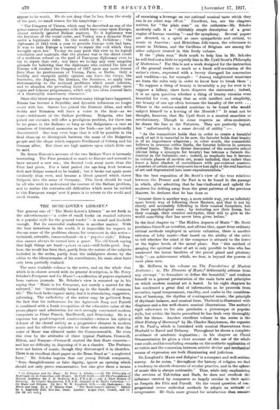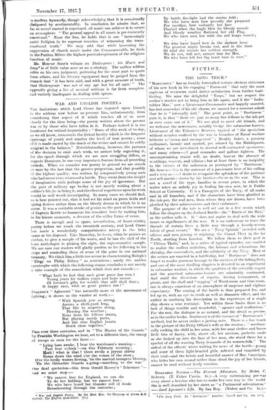THE MUSIC-LOVER S LIBRARY.•
Toe general aim of " The Music-Lover's Library " as set forth in the advertisement—" a series of small books on musical subjects in a popular style for the general reader "--is sound and laudable enough. But its successful realization is another matter. With the beat intentions in the world, it is impossible for experts to discuss some of the problems chosen for treatment in this series— technical, scientific, transcendental—in a popular style." Educa- tion cannot always be turned into a game. The old Crook Baying that high things are hard—xaXerni ri xeSe—still holds good. Any- how, the result hoe been that, partly from the nature of the subjects included in the series, partly from the indulgence shown by the editor to the idiosyncrasies of his contributors, his main aims have only been partially realized.
The most readable volume in the series, and on the whole that which is in closest accord with its general description, is Mr. Percy ficholes'sErsreman and Iris Music '—a collection of papers reprinted from various journals. Mr. Scholee's view is summed up in his saying that Mettle is for Ersryman, not merely a matter for the cultured." but " inextricably bound up in the bundle of common life." The book lacks organic unity, but it is stimulating, suggestive, informing. The catholicity of the writer may be gathered from the fact that his enthusiasm for the Agincourt Song and Purcell is combined with a frank recognition of the educative value of the piano-player and admiration for such strongly contrasted modern composers as Naar Franck, MacDowell, and Stravinsky. He is a vigorous but good-tempered controversialist--witneas his spirited defence of the choral society as a progressive element in modern music and his effective rejoinder to those who maintain that the voice of Music was silenced under the Commonwealth. He tests this view by the attitudes of three typical Puritan'', Cromwell, Milton, and Bunyan--Cromwell started the first State concerts— and has no difficulty in disposing of it as a slander. The Puritans were not haters of music, though they discouraged it in churches. There le an excellent short paper on the Brawl Band as " a neglected fume." Mr. Scholes regrets that our young British composers, " from thoughtlessness or false dignity, ignore an opening which should not only prove remunerative, but also give them a means
• (If Ererynigri and Ais Marie. By Percy A. Scholes.—(4) The Philosophy of Modernism (is es Cosner/ion rah Mahe). By Cyril Scotts—(a) ThePodadationaof
Alusieal Aestheties. By J. B. Meltiren, F.ILA.M.—(4) A Short Iliatory of Harmony. By Charles allepherson, F.R.A.51.. Organist of St. Pasra Cathedral.— fee Moak sod Religion. By lire. W. W. Longford, II.D.--(8) Shakespeare: his Music sad ersw. By A. et. Moneta Sane. "Slit attnie-Lover's lAbrary," adlaal by A. Reeleteid 3.11a.Doo. Oxon. Loudon: Began Paul, Trench, and Co. (la. ed. net each.] of exercising a leverage on our national musical taste which they can in no other way effect." Excellent, too, are the chapters written for "the plain man" on the orchestra—Mr. Scholes modestly calls it a " ohildiehly simple description of a great engine of human emotion "—and the symphony. Several papers are devoted, in a spirit at once sympathetic and critical, to music in America ; ' and Hebridean folk-tunes, the references to music in Dickens, and the Carillons of Belgium are among the other subjects treated in this lively volume.
If the " plain man " finds much to help him in Mr. Scholes he will find not a little to mystify him in Mr. Cyril Scott's Philosophy of Modernism.. For this is not a work designed for the instruction of the general reader so much as a frank self-revelation of the writer's views, expressed with a breezy disregard for convention and tradition—as, for example t " Among enlightened musicians we learn the rules only in order to know how to break them " ; " To suppose a thing of beauty is invariably a joy for ever is to suppose a fallacy, since facts disprove the statement ; indeed, it is an open question whether a thing of beauty remains even beautiful for ever, seeing that as with intellect and simplicity, the beauty of one ego often becomes the banality of the next. ... Where is the serious-minded musician to be found who would subject himself to a hsaring of the Messiah P " It most not be thought, however, that Mr. Cyril Scott is a musical anarchist or revolutionary. Though in some respects an ultra-modernist, he draws the line at the Futurists. They are perfectly logical, but " unfortunately in a sense devoid of utility " t- " As the romanticist holds that in order to create a beautiful work of art it is essential to be new, the futurist holds that beauty is of no importance whatever ; in other words, the romanticist believes in newness within limits, the futurist believes in newness without limits. Thus the divine discontent of the roman-tie school (divine being a synonym for beauty) has become a Battelle dis- content in the futurietio one ; indeed, so emphatic has it become in certain phases of modem art, music Included, that rather than leave a faint shadow of resemblance with pre-existent masters, a number of artiste and composers have lost sight of the real lunation of art and degenerated into mere experimentalists."
But the best exposition of Mr. Scott's view of the true relations between the Present and the Past is to be found in the passage in which, after admitting that he has vindicated and upheld the moderns for drifting away from the great patterns of the previous Masters, he declares that he has done so " because there is another way, a more subtle way, yet an infinitely more heroic way of following those Masters, and that is not by closely and accurately following in their musical footprints, but in their psychological once; by imitating not their forms, but their courage, their creative enterprise, their will to give to the world something that has never been given before."
In the final chapter on " The Hidden Aspects of Music " Mr. Scott proclaims himself an occultist, and affirms that, apart from ordinary critical methods employed in artistic valuation, there is another criterion of lofty mueio—that based on the ability of the critic to tell whether the mind of the composer is attuned to the lower or the higher levels of the astral plane. But " this method of gauging the spiritual value of art is only possible to him who has awakened the latent faculties of the pineal gland and pituitary- body "—an achievement which, we fear, is beyond the powers of most plain men.
Mr. MeEwen in his volume on The Foundations of Musical Aesthetics ; or, The Elements of Music,s deliberately refrains from any attempt to formulate or define the beautiful," and confines himself to a general presentation of the main facts and principles on which modem musical art is based. In his eight chapters'he has condensed a great deal of information as he proceeds from acoustics, equal temperament, tonality, and scales to tho considera- tion of harmony, the rhythm of contrapuntal music, the principle of rhythmic balance, and musical form. Thebook is illustrated with diagrams and a few well-ohoeen musical illustrations. The author's rigid adherence to his aim precludes a picturesque or popular style, but within the limits prescribed he has dealt very thoroughly with his theme. Another excellent volume in the series is the Short History of Harmony.. by Mr. Charles Maopherson, the organist of St. Paul's, which is furnished with musical illustrations from - Huebald to Ravel and Debussy. Throughout he shows a complete avoidance of academic dogmatism ; in his chapter on Chord Ornamentation he gives a clear account of the use of the whole tone scale, and hie concluding remarks on the aesthetic application of acoustics and the connexion between artistic device and mechanical means of expression are both illuminating and judicious.
Dr. Longford's Masi., and Religion• is a compact and well-written survey. As he notes, " throughout the history of religion we find a tendency to absorb elements of secular practice, and in the sphere of music this is always noticeable." Thus, while duly emphasizing the services of Palestrine, and Bach, he does not overlook the influence exerted by composers so largely secular in their spirit as Joequiu des Pole and Purcell. On the vexed question of con- gregational versus cathedral methods he adopts an attiteule of compromise. He finds more ground for satisfaction than mums, la modern hymnody, though acknowledging that it is occasionally disfigured by sentimentality. In conclusion, he admits that, so far as moral control is concerned, all mimic can achieve is to create an atmosphere. "Tho general appeal in all music is pre-eminently emotional." None the less, lie holds that it can " increasingly assist Religion in its supreme vocation of witnessing the trans- cendental truth." We may add that while lamenting the suppression of church music under the Commonwealth, ho fords in the Puritan Milton the highest poetical expression of the religious function of music.
Mr. Moneur Sierra's volume on Shakespeare : his Music. and Songs is of little value save as an aothology. The author seldom relies on his own judgment, preferring for the most part to quote from others, and his literary equipment may be gauged from the remark that " it has been said, and with a great measure of truth, that Shakespeare was not of any age but for all ages.' " The appendix giving a list of musical settings is far from complete. and entirely inadequate in dealing with operas.















































 Previous page
Previous page